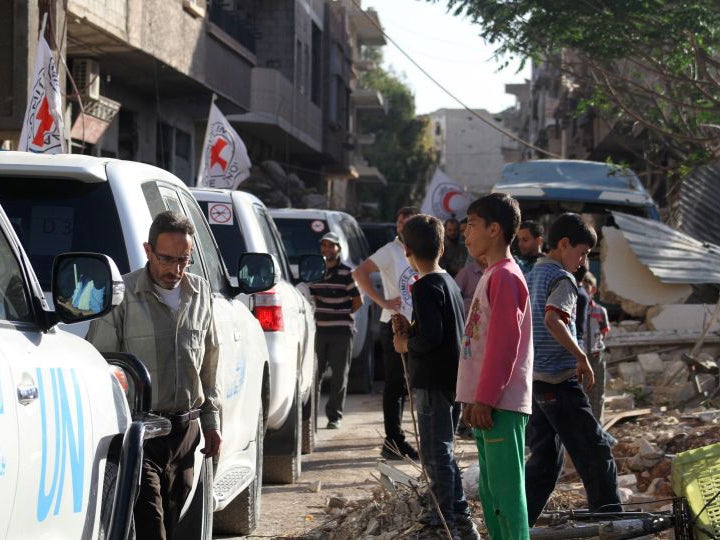Syria: First aid convoy enters besieged Darayya since 2012
The aid delivered to the famished town contained medical supplies, vaccines, baby milk and nutrition items, but not food

The devastated Syrian town of Darayya in rebel-held Damascus has received its first aid convey since 2012.
President Bashar al-Assad had previously refused to allow aid to starving civilians in the town and Wednesday’s joint convey, organised by the International Committee of the Red Cross, the United Nations and the Syrian Arab Red Crescent, entered as the Syrian government faced a deadline to allow aid by road or risk having air drops imposed by the countries of the International Syria Support Group (ISSG).
The aid entered three weeks after another convoy was prevented from entering the town by elite Fourth Armoured Brigade forces, commanded by the president’s brother Maher al-Assad.
Russia's Defence Ministry said it had co-ordinated a 48-hour local ceasefire with Syrian authorities and the US in order “to secure delivery of humanitarian aid to the population.”
The aid delivered to the famished town contained medical supplies, vaccines, baby milk and nutrition items, but not food.
ICRC spokesman Pawel Krzysiek, who accompanied the convoy, told the Guardian: “They were not angry, they were very positive and open – they are people like us. But they want to eat and we must bring to them food as soon as possible.”
Jakob Kern, the World Food Programme director in Syria, said the government had not allowed food in the first delivery, but another convoy with food was planned for delivery on Friday when fighting is expected to be suspended again to allow aid in.
The UN has previously warned children could die of starvation because of the "horrendously critical" situation in Darayya, Mouadamiya, and a third area, al Waer, which did not receive any aid on Wednesday.
Mr Kern said action was being taken on delivering food to al Waer, but he could not give any details. He said it was too soon to say if there was an overall breakthrough on aid access.
Syrian operator negotiator, Basma Kodmari, said the aid to Darayya and nearby Moua damiya, another besieged zone, was just the first step as a result of extreme international pressure on the Syrian government, and significant action was still needed.
"The first lesson is that pressure and ultimatums are the only way we get the regime to hear anything," Ms Kodmari said. "We will obviously not be content with one convoy as happened today."
"If we don't see substantial change, then we definitely are waiting for those air drops to happen as a sign of the seriousness and the commitment of the international community.”
The ISSG humanitarian taskforce are due to meet on Thursday, according to Ms Kodmari, to review progress on getting aid to more than a million needy people in besieged and hard-to-reach areas.
The UN estimates 4,000 civilians are still in Darayya, which is close to a large air base and has been besieged and regularly bombed since 2012.
Some 45,000 civilians are still in Mouadamiya , but government employees are now allowed to go in and out.
Foreign Secretary Philip Hammond said Syria's government had "cynically allowed limited amounts of aid" into besieged areas but failed to deliver the widespread humanitarian access called for by the international community.
“While air drops are difficult, costly and risky, they are now the last resort to relieve human suffering across many besieged areas," he said in a statement.
Palmyra recaptured by Syrian government forces
Show all 10"Countries with influence over the Assad regime such as Russia and Iran must now ensure that these air operations can proceed in a safe and secure manner."
Staffan de Mistura, the UN mediator of Syria peace talks, has said he wants to see improved humanitarian access, as well as a renewed lull in the fighting, before announcing a date for a new round of peace talks in Geneva after the last round ended on 28 April.
The opposition High Negotiations Committee has proposed a nationwide truce during the month of Ramadan, which would restore the "cessation of hostilities" that prevailed for two months from the end of February.
Additional reporting by Reuters
Subscribe to Independent Premium to bookmark this article
Want to bookmark your favourite articles and stories to read or reference later? Start your Independent Premium subscription today.

Join our commenting forum
Join thought-provoking conversations, follow other Independent readers and see their replies